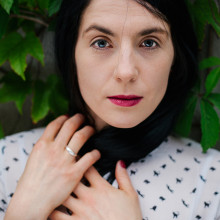Polish literature

Małgorzata Lebda
was born on 23.08.1985 in Nowy Sącz; she is a poet, a PhD in the humanities, and an adjunct professor at the Institute of Information Sciences at the National Education Commission Pedagogical University in Krakow.
She is a person of many passions – athletics (she regularly takes part in ultra-marathons), photography (she continually updates a web pages with her work), and academia (her research interests orbit around the relationships between literature and the visual arts). It is her poetry, however, that has brought her fame. Małogorzata Lebda is now considered one of the most promising poets of the younger generation, with her own inimitable poetic idiom and considerable literary experience. She made her debut in the school journal Nowy Legion (No. 7-8, 2005). That same year she claimed her first award in poetry in a competition organized by the Pedagogical University. More honors were soon to come – including an award in the “On Wawrzyn Sądecczyzny” competition in 2007. A year later, the poet received the City of Krakow Creative Scholarship and the Grazelli Scholarship. It was also then, in 2006, that she published her first collection, Open on Page 77. Her next volume – Tropes – appeared in 2009. The critics agree that it was in this second book that Lebda set the real framework of her poetics and marked out the contours of her poetical imaginarium. We should also point out that, from then on, she was a more frequent contributor to literary journals, and her volume The Edge of the Forest (2013) was nominated for the K. I. Gałczyński Orpheus Poetry Award (2014), and for the Krystyna and Czesława Bednarczyk Poetry Award (2014). She received even more acclaim for Backwoods, published in 2016. It was this book that won Małgorzata Lebda the Orpheus Award in 2017, Krakow Book of the Month, and a Stanisław Barańczak Scholarship as part of the Poznań Literary Award.
Małgorzata Lebda’s path as a poet begins with the tiny impressions and lyrical notes of her debut volume, then adopts a narrative form in her next book. Her three most recent books are filled with these poetic tales. Their material, however obvious this seems, is made up of events, enclosed in lyrical frameworks, trapped in dense, metaphorical images. One might even say they are symbolic, as this poetry contains many cultural symbols, images building a network of archetypes. All this means that Lebda’s poetic images are not only a representation of the outside world, but also states of the spirit, suffused with subjective emotions.
The limits of this subjectivity seem to be marked by her autobiography, from which the poems draw their dynamic and strength. Lebda makes no attempt to hide this. On the contrary, she makes every effort to have us associate the rustic scenes in her poetry with her old hometown. The village of Żeleźnikowa, now practically a suburb of Nowy Sącz, appears in Lebda’s poetry as it once was – with all its local color and customs, with its peculiar ethnicity woven from many elements. In an equally consistent fashion, the writer transcends her own biography, makes the images ambiguous enough to ensure they speak not only about her, but about us as well. About people in general. This is possible through her above-mentioned effort to transcend realism and symbolize her images. The world of Lebda’s childhood, the world of Żeleźnikowa, becomes a model of the world as such. Light and dark, times of day, night, and the year, the four elements, plants, animals, the home, religious customs, and the simplest acts – everything becomes part of her tales of fate, of life and death.
These tales, we should stress, often are structured on memory. Memory is the constitutive component of Lebda’s poetry. We know that this is not strictly autobiographical memory, we too clearly see the marks of cultural memory – the archetypes that weave throughout the events described. It is true that at the root of many pieces the poet finds the experience of loss. But it is also true that this absence gives rise to new forms of presence. The author knows that the smells and moods of childhood have vanished, that the home is gone, that there is no more attic, no stream and no well, there are no trees in the family orchard, nor the people who walked in it, that her parents are dead. Yet she experiences this loss as a presence. What has vanished in the world returns in the consciousness – it haunts us in our dreams, both night and day. It slowly turns into myth. We should be clear on one point: these poems do not build an Arcadian myth. Holiness mixes with cruelty, water with blood, love with death. The soil of myth-building poetry, rooted in the experience of the earth, one plowed by Tadeusz Nowak, for one, has found a worthy successor in Małgorzata Lebda.
Wojciech Kudyba
BIBLIOGRAPHY
- Otwarta na 77 stronie, Wydawnictwo Towarzystwa Słowaków w Polsce, Kraków 2006
- Tropy, Zeszyty Poetyckie, Gniezno 2009
- Granica lasu, Wydawnictwo WBPiCAK, Poznań 2013
- Matecznik, Wydawnictwo WBPiCAK, Poznań 2016